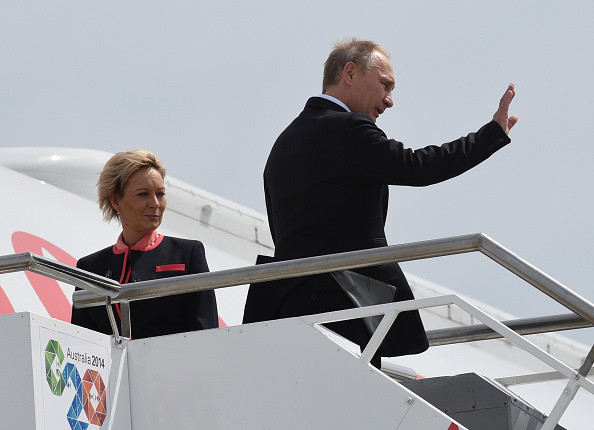Simon Heffer: Putin Took a Kicking at G20 but Name-Calling Won't Stop Russia's Aggression
Vladimir Putin seems to be developing a thin skin, which may be just as well if it persuades him to be more receptive to international public opinion. Ridiculed for walking out of the G20 summit in Brisbane in something of a huff and having his presidential jet take him back to Moscow early, he went out of his way to protest that he left purely because he wanted to get some sleep before he started work on Monday morning.

He also claimed that he had had constructive talks and said that there had been an agreement that sanctions - imposed on his regime because of its interference in Ukraine - were hurting both Russia and the nations that imposed them. It was almost as if he wished to be diplomatic and reasonable.
The conduct of the summit was bemusing. It was hard to see why Putin, in disgrace with most of those present, was even invited. He not only presides over a kleptocracy in which his opponents are silenced ruthlessly and, sometimes, brutally, but one that is using its considerable armed clout systematically to violate the sovereignty of a neighbouring state and to annex parts of its territory.
His conduct of statecraft is anathema to most of the nations whose leaders were forced to break bread with him in Brisbane. Yet if he were to be invited, there was no point, having secured his attendance, for the other nations simply to berate him. David Cameron ridiculed him for having ordered warships to the seas off northern Australia. Stephen Harper, the prime minister of Canada, and Tony Abbott, the Australian premier, both told him bluntly to get out of Ukraine.
Barack Obama, who has not made a habit of making a stand on this issue, warned about further sanctions. Angela Merkel, who presides over the economy not only of one of Russia's biggest customers but of one of its biggest suppliers, was similarly intransigent, despite the undoubted harm sanctions are doing to German business.
So it was a bruising, humiliating and unpleasant encounter for Putin, who like most autocrats is more used to getting his own way and being treated with cowering respect. He was in a milieu where his word was not law and where he was no longer in charge. No wonder he didn't stay for lunch, or for the issuing of the G20's final, vapid communiqué about hoping for growth in the world's economy – a pronouncement, incidentally, that will remain meaningless so long as large economies such as the eurozone pursue an policy of overvaluing their currency and overregulating themselves.
What is less clear is whether the near-unanimous kicking given to Putin will cause him to moderate his offensive behaviour, or be an incentive for him to ratchet it up. The bad news for Putin's adversaries is that aggression against the perceived enemies of the Russian people is a cheap way for him to maintain his popularity at home at a time when there is little else to offer.
The sharp fall in the price of oil has been another serious blow for an economy already hurt by sanctions. It limits what Putin is able to offer by way of material improvements for a public that, generally, does not share in the kleptocratic spoils enjoyed by him and his friends in the ruling elite. If they have access to international news, Putin's public will be aware that their leader has been roughed up by the "decadent" West. The leader, in turn, will be looking for ways to save his face.

Last week Nato reported that significant amounts of Russian hardware were coming over the border into Ukraine, accompanied by equally significant numbers of military personnel. The annexation of the Crimea appears now to be accepted by the West.
Putin's hope is that those in eastern Ukraine who feel a natural empathy with Russia can effect a similar annexation of territory, only this time of land not given to Ukraine by Nikita Khrushchev when he was drunk. It is one thing for the leaders of the West to call Putin names. It is quite another for them to devise an effective policy to stop his aggression.
Sanctions can, and probably should, be stepped up: not just further restrictions on where Putin's cronies can travel, but possibly also asset freezes so there is no safe haven in Europe for the elite's money. But this undeniably painful pressure has to be coupled with a serious conversation through diplomatic channels about how matters would improve if Putin withdrew support for the rebels in east Ukraine, evacuating troops and weaponry from that part of the country, and allowing a UN force to police the area to restore order. The alternative is eventual partition and a humiliation for Europe and America. It ought to be an easy choice.
Dr Simon Heffer is a British commentator and author who has written columns for The Daily Mail, The Daily Telegraph, The Spectator and The New Statesman. He is the biographer of Enoch Powell, Thomas Carlyle and Ralph Vaughan Williams and recently published High Minds: The Victorians And The Birth Of Modern Britain.
© Copyright IBTimes 2025. All rights reserved.






















